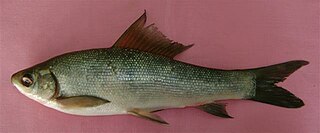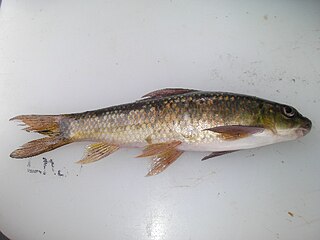
The rohu, rui, ruhi or roho labeo is a species of fish of the carp family, found in rivers in South Asia. It is a large omnivore and extensively used in aquaculture.

Catla, also known as the major South Asian carp, is an economically important South Asian freshwater fish in the carp family Cyprinidae. It is native to rivers and lakes in northern India, Bangladesh, Myanmar, Nepal, and Pakistan, but has also been introduced elsewhere in South Asia and is commonly farmed.

The Kuria labeo is a species of fish in the carp family, Cyprinidae. It is native to Pakistan, India, Bangladesh, and Burma, and it is known from Afghanistan and Nepal.

The orangefin labeo is a fish of the carp family Cyprinidae, found commonly in rivers and freshwater lakes in and around South Asia and South-East Asia. Native to Bangladesh and India.

Labeo angra is a species of fish in the family Cyprinidae, the carps and minnows. It is commonly known as the Angra labeo. It is native to Asia, where it is distributed in Bangladesh, Burma, Nepal, and Pakistan. It has also been reported from Afghanistan.
Labeo alluaudi is a species of fish in the family Cyprinidae, the carps and minnows. It is native to the Cavally and Nipoué Rivers in Côte d'Ivoire and Liberia. It has also been reported from the Sewa River in Sierra Leone and the Via River in Liberia.
Labeo alticentralis is a species of fish in the family Cyprinidae, the carps and minnows. It is endemic to the Democratic Republic of the Congo, where it has been recorded from just a few locations, including two near Kisangani and one at Pool Malebo, a section of the Congo River.
The rednose labeo is a species of fish in the family Cyprinidae, the carps and minnows. Other common names include Hunyani labeo, Manyame labeo, rednose mudsucker, and sailfin mudsucker. It is native to Africa, where it is distributed in the Democratic Republic of the Congo, Malawi, Mozambique, Zambia, and Zimbabwe.

Labeo annectens is a species of fish in the family Cyprinidae, the carps and minnows. It is native to central Africa, where it occurs in several river basins, including the Congo River basin.

The black sharkminnow, also known as the black shark or black labeo, is a species of freshwater fish in the carp family. It is found in the Mekong and Chao Phraya river basins, Malay Peninsula, Sumatra, Java and Borneo. It can reach a length of 90 cm (3 ft) and a weight of 7 kg (15 lb). It is sometimes seen in the aquarium trade, but is generally unsuitable for home aquaria due to its large adult size and territorial, aggressive behavior.
Labeo boulengeri is a fish in genus Labeo, a genus of carp. Like most fish of its genus, it is a generally tropical fish. It inhabits the Uebi Scelebi river of Ethiopia. It has a maximum length of 22.5 cm.

The fringed-lipped peninsula carp is a cyprinid fish in genus Labeo from Pakistan, India, Nepal, Bangladesh and Myanmar. It is listed as Least Concern in the global IUCN Red List of threatened species.

The pigmouth carp is a cyprinid, benthopelagic, tropical fish found in India.

The Nile carp is a fish species in the genus Labeo. It feeds primarily on plankton, and is distributed along the entire Nile valley. It is generally believed to be the fish that swallowed the phallus of the Egyptian god Osiris in the myth regarding his death at the hands of his brother Seth.
Labeo polli is a species of fish in the genus Labeo from the Congo Basin. It is found only in the Kafubu River (Haut-Katanga) and the Kanshéle River (Kivu).

The redeye labeo or African carp is a species of fish in the cyprinid genus Labeo. It is a freshwater fish endemic to the rivers of East Africa, from the Zambezi through the Limpopo and Komati Rivers to the Pongola River. It also inhabits upper and middle parts of the Congo River.

The Cunene labeo or Kunene labeo is a species of fish in the family Cyprinidae, the carps and minnows. It is native to Angola and Namibia.

Boggut labeo or the minor carp is an Asian freshwater fish of the family Cyprinidae. It is known from Pakistan, India and Bangladesh.

The mrigal carp, also known as the white carp, is a species of ray-finned fish in the carp family. Native to streams and rivers in India, the only surviving wild population is in the Cauvery River, leading to its IUCN rating as vulnerable. It is widely aquafarmed, and introduced populations exist outside its native range. It reaches a maximum length of 1 m (3.3 ft). This species and Cirrhinus mrigala are considered distinct.
Ptychidio jordani, the ratmouth barbel, is a species of freshwater, ray-finned fish from the carp family, Cyprinidae. It is endemic to the Pearl River drainage system, purported records from Taiwan being considered extremely doubtful. It has been a highly sought species for fisheries but the population has declined to such an extent that it is now rarely caught and the damming of its native streams and rivers is now the chief threat to this species. This species is found in fast flowing, clear, streams and rivers flowing over gravel substrates, spawning in rapids. It is a demersal species which feeds on molluscs and algae. It is now a protected species in Yunnan but this little known species requires further research to determine how best to conserve it. It grows to a maximum size of 33 cm (13 in). The specific name jordani was applied by George S. Myers in honor of ichthyologist David Starr Jordan in appreciation of his friendship and kindness to Myers.















